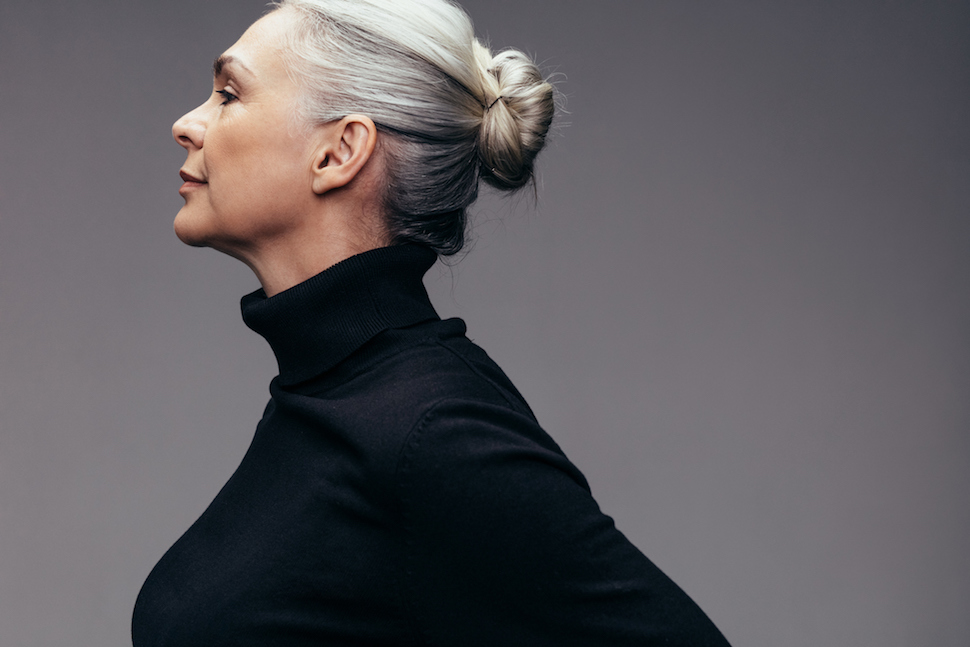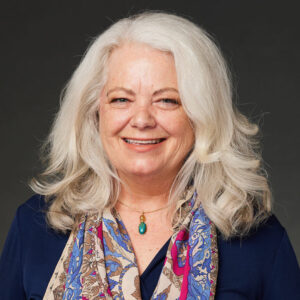
“Post Covid, there is a renewed focus on spas as places that provide services to age well and promote healthy longevity,” attests Nancy Griffin, principal Contento Marketing and Host of the Glowing Older Podcast. Griffin, a respected spa industry veteran, has been hard at work on a new initiative, #ExposeAgeism, and aims to build a movement that encourages beauty, spa, and wellness companies to eliminate ageist stereotypes in their marketing and operations.
“My point is it is contrary to promote positive aging along with negative perceptions of aging,” says Griffin. “It’s wonderful to take steps to make yourself feel and look better, but we should not be shamed into feeling bad about ourselves for the normal aging process.” Insider’s spoke with her to learn more.
Tell us a bit about you and how #ExposeAgeism came to be.
I started my career in the spa industry 30 years ago during my Masters program at Cornell Hotel School. My specialties have been identifying trends, storytelling to the trade media, and matching buyers and sellers. At the beginning of Covid when the spas shut down, so did most of my business. It gave me time to reflect and consider my goals for the future.

Nancy Griffin
My interest in senior living began with my grandparents. My grandfather helped found a senior living community outside of Baltimore in the mid 70’s, where both my sets of grandparents lived until they passed. Although considered one of the best communities in the country, it still had an institutional feel and left a lot to be desired. Through the years I had been watching the trends in senior living towards wellness and a lifestyle approach, so I decided to learn as much as I could about this industry. I started my Glowing Older podcast to interview the best and the brightest in the space—I viewed it as getting an informal MBA in senior living.
Since starting the podcast in August 2020, I have interviewed 130 experts in senior living and the business of aging well. I learned that one of the biggest issues standing in the way of aging well is ageism. The more I dug into this topic, the more I realized the spa, beauty, and wellness industries were contributing directly to ageism by promoting the pursuit of youthful appearance as “better” than looking your age. “Anti-aging” seemed like the most egregious pursuit because it is anti-living.
Ageism experts Ashton Applewhite, author of This Chair Rocks, a Manifesto Against Ageism. Tracey Gendron, author of Ageism Unmasked, and Bradley Shurman, author of SuperAge, were all guests on my show, and all have condemned the use of “anti-aging” as shaming, and frankly, just dumb. Ashton has an excellent Ted Talk, Let’s End Ageism with nearly two million views, and was using the hashtag #ExposeAgeism on her social posts. When I saw the URL exposeageism.com was available back in 2020, I acquired it. The ExposeAgeism movement was born out of my desire for our industry to promote positive aging. I want us to do better.
How do you define ageism, and where does this word even come from?
In 1968, gerontologist Dr. Robert Butler coined the term “ageism” to describe the systematic discrimination against older people. He equated it to racism and sexism during the Civil Rights movement. According to the World Health Organization, ageism can change how we view ourselves, can erode solidarity between generations, can devalue or limit our ability to benefit from what younger and older populations can contribute. Lifetime exposure to negative stereotypes of older adults leads to the internalization of ageism. People are made to feel aging means inevitable decline, which impacts our health, longevity, and wellbeing.
For example, ageism is associated with earlier death (by 7.5 years), poorer physical and mental health, and slower recovery from disability in older age. Ageism also increases risky health behaviors, such as eating an unhealthy diet, drinking excessively or smoking, and reduces our quality of life. In the United States, one in every seven dollars spent on healthcare every year for the eight most expensive conditions was due to ageism (US$ 63 billion in total).
The goal of ExposeAgeism is to create awareness and education around the harmful aspects of aging, and help change the narrative.
Why #exposeageism now, and why target the spa/beauty/wellness industry?
Targeting the spa, beauty, and wellness industry makes sense for two reasons. First, it is where I have spent the majority of my professional career, so I have intimate knowledge of the mindset, and second, the industry promotes negative perceptions of aging at every turn.
In 2017, Allure magazine announced that the publication would no longer use the phrase anti-aging. Editor-in-Chief at the time Michelle Lee said, “Whether we know it or not, the phrase subtly reinforces the message that aging is a condition we need to battle.” This message makes no sense for an industry built on promoting wellbeing and “first do no harm.” Anti-aging causes harm because the message is, we are not okay as we are. That aging is something we need to fear and fight.
Expose Ageism encourages beauty, spa, and wellness companies to eliminate ageist stereotypes in their marketing and operations.
Expose Ageism encourages beauty, spa, and wellness companies to eliminate ageist stereotypes in their marketing and operations. We encourage progressive and inclusive companies to join us in combatting discrimination based on age.
What do you hope to achieve with this initiative?
That’s the key question. We currently have 10 founding companies signed up. Some have avoided “anti-aging” from the get go, while others are in the process of removing the phrase from their websites, product packaging, and marketing materials. My hope is that the movement builds to encourage many other companies to take the pledge and eliminate the phrase.
To date, what kind of response have you received from the spa/beauty/wellness industry overall? What are the challenges you face?
The response has been polarized, frankly. Founders and company heads either immediately “get it” and are in, or reject it outright based on fear that it will negatively impact their business. Even though many people, especially younger people, are turned off by the phrase “anti-aging,” it is a popular keyword, searched by many seeking a solution for aging skin.
No doubt I have “ruffled a few feathers” by launching this movement. My initial outreach to friends and colleagues in the industry resulted in a lot of “no thank you’s” and ignored emails. I have also been accused of promoting “cancel culture,” meaning I want companies using the phrase anti-aging to be ostracized, boycotted, or shunned. But my goal is simply to create awareness and educate the industry about ageism, while promoting positive perceptions of aging.
Who was the first company to sign on?
Body Bliss, my client of 10 years, was the first to sign on. Pam Sculthorp, CEO, is in her “second act” after a successful career in the pharmaceutical industry. She has seen the negative consequences of ageism and was happy to support my efforts.
Why is this campaign so important now?
Post Covid, there is a renewed focus on spas as places that provide services to age well and promote healthy longevity. My point is it is contrary to promote positive aging along with negative perceptions of aging. It’s wonderful to take steps to make yourself feel and look better, but we should not be shamed into feeling bad about ourselves for the normal aging process.
Awareness of ageism is also gaining momentum worldwide. WHO is working together with key partners on a Global Campaign to Combat Ageism—an initiative supported by WHO’s 194 Member States. The Campaign aims to change the narrative around age and ageing and help create a world for all ages. The report identifies three strategies that work in reducing or eliminating ageism: policy and law, educational activities, and intergenerational interventions.
How do people get involved?
Companies join the movement by signing up on the exposeageism.com website, and taking the pledge, below. There is no money involved to participate.
We pledge to promote positive aging for people of all races and ethnicities, abilities and disabilities, genders, religions, cultures, and sexual orientations.
We pledge to include representation of older adults in Diversity Equity Inclusion policies (formal or informal) that promote participation of diverse groups of individuals.
We pledge to take steps to eliminate the phrase “anti-aging” from our product descriptions and marketing by 2025.
The ultimate goal is to promote positive aging and a healthy, stress-free attitude about aging skin and appearance. Many companies are not aware of the harm they are doing by shaming people into trying to maintain youth at all costs. Increased awareness and education will create change.
I love this quote: “Ageism is prejudice against your future self.” Can you speak to that a bit?
“Ageism is prejudice against your future self,” refers to the fact that we are “all old people in training.” Both phrases were coined by Ashton Applewhite—meaning ageism affects us all because we will all be old someday (if we are lucky.) If you are not aging, you are not breathing.
After a lifetime absorbing negative perceptions of aging, older adults can be the most ageist of any age group. One of the reasons we strive to look younger is maintain an “us” versus “them” mentality based on appearance and abilities. One of the biggest downsides in the battle against aging is the stress it creates. And as we know, stress is a significant contributor to aging.
Numerous studies around the globe prove that we live longer, and healthier, when we accept aging as a normal part of life. That is the message I hope to relay, and eliminating anti-aging from our vernacular as spa and wellness professionals seems like a great way to start. Time will tell!
Mary Bemis
Mary Bemis is Founder & Editorial Director of InsidersGuidetoSpas.com. An advocate for all things spa, Mary forged a vocabulary for spa reportage that is widely used by those who cover the issues today. Recently honored as a Top 30 Influential Voice Transforming Wellness by Medika Life, Mary is an inaugural honoree of Folio’s Top Women in Media Award. Her spa media roots run deep—in 1997, she launched American Spa magazine, in 2007, she co-founded Organic Spa magazine, and in between serving on the ISPA and NYSPA Board of Directors, she was on the launch teams of Luxury SpaFinder and New Beauty magazines. Named a "Wonder Woman of Wellness" by American Spa magazine, Mary was honored by the International Spa Association with the distinguished ISPA Dedicated Contributor Award. She is a special advisor to the non-profit Global Wellness Day.
- Web |
- More Posts(81)